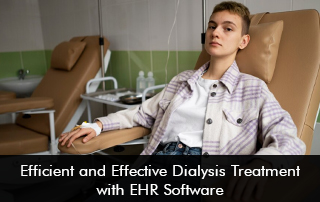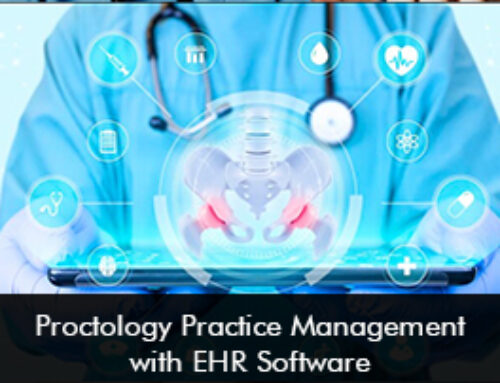Electronic Health Record (EHR) software has become an indispensable tool for improving patient outcomes and streamlining operational efficiency. Nowhere is this more relevant than in dialysis treatment, where managing chronic kidney disease (CKD) requires precise, personalized, and consistent care. With the rise in CKD prevalence and the complexity of dialysis treatment, EHR systems tailored for nephrology and dialysis clinics are proving invaluable. They enable care teams to manage treatment schedules, monitor patient outcomes, and ensure compliance with healthcare regulations efficiently.
These tools are instrumental in improving the quality of life for patients undergoing dialysis while simplifying the workflow for nephrologists and clinical staff. EHR software is increasingly vital in assisted living and senior care, helping caregivers manage complex health needs with greater accuracy. EHR systems in senior care facilities ensure seamless communication, better documentation, and improved patient-centered care. With the rising number of seniors requiring personalized care, EHR solutions are becoming essential to meeting these growing demands.
Efficient and Effective Dialysis Treatment with EHR Software
In dialysis clinics, EHR software is key to managing complex treatments, ensuring safe and effective care for patients with chronic kidney disease. EHR systems tailored to dialysis enable clinics to track treatment data, manage scheduling, and monitor patient progress. Given the life-saving nature of dialysis, these specialized EHRs play a crucial role in enhancing the quality and efficiency of patient care.
-
Dialysis Scheduling and Coordination
- EHRs streamline appointment scheduling, accommodating patient routines and dialysis needs.
- Coordinated scheduling reduces patient wait times and ensures a steady workflow.
-
Real-Time Monitoring of Patient Data
- EHRs monitor vital signs and dialysis metrics in real time, alerting staff to any irregularities.
- Real-time data ensures prompt response to any complications during treatment.
-
Data-Driven Treatment Plans
- EHRs enable tracking of each patient’s treatment history, customizing care to individual needs.
- Data analysis supports informed decision-making, improving patient outcomes.
Key Benefits of EHR Software in Dialysis Treatment
-
Seamless Data Integration and Access
- Centralizes patient records, including lab results, treatment plans, and historical data.
- Facilitates real-time access to critical patient information across care teams.
- Reduces errors by integrating lab interfaces and dialysis equipment with the EHR system.
-
Streamlined Treatment Planning
- Customizes treatment plans based on individual patient needs, ensuring optimal care.
- Automates medication management and dialysis prescription adjustments.
- Enables dynamic scheduling of dialysis sessions and manages capacity effectively.
-
Enhanced Compliance and Reporting
- Tracks and ensures adherence to Medicare and Medicaid regulations.
- Facilitates streamlined reporting to governing bodies such as CMS (Centers for Medicare & Medicaid Services).
- Minimizes the risk of penalties with accurate documentation and audit trails.
-
Improved Patient Engagement and Satisfaction
- Provides patients with access to their health data through patient portals.
- Improves communication between patients and providers via telehealth integration.
- Empowers patients with educational resources tailored to their condition.
-
Advanced Analytics and Predictive Insights
- Identifies trends in patient health to predict complications early.
- Provides actionable insights to improve patient outcomes and reduce readmissions.
- Helps clinics optimize operations with dashboards and performance metrics.
Top 5 EHR Software for Dialysis Treatment
-
Epic Systems
Epic is a leader in EHR solutions, known for its comprehensive and customizable features.
- Integrates seamlessly with dialysis machines and other medical equipment.
- Offers robust analytics tools to monitor patient outcomes and operational performance.
- Features an intuitive patient portal that enhances patient engagement.
- Complies with all major regulations, ensuring data accuracy and security.
Cerner’s specialized solutions for nephrology streamline dialysis workflows effectively.
- Features customizable templates for dialysis and CKD management.
- Provides real-time interoperability with other healthcare systems.
- Enables precise medication tracking and automated alerts for prescription adjustments.
- Focuses on data-driven decision-making with built-in analytics tools.
-
Fresenius Medical Care’s Acumen 2.0
Designed specifically for nephrology practices, Acumen 2.0 stands out for its tailored features.
- Offers seamless integration with Fresenius dialysis machines.
- Facilitates streamlined billing and documentation for nephrology care.
- Provides robust telehealth capabilities for remote patient monitoring.
- Ensures compliance with CMS and other regulatory frameworks.
-
Allscripts Sunrise
Allscripts is renowned for its user-friendly interface and comprehensive feature set.
- Supports end-to-end care coordination for CKD and dialysis patients.
- Offers predictive analytics to manage patient health proactively.
- Features a cloud-based architecture, ensuring scalability and secure access.
- Enhances interoperability with a wide range of medical devices and systems.
-
NextGen Healthcare
NextGen specializes in ambulatory care and provides excellent solutions for nephrology.
- Features a nephrology-specific EHR module for dialysis and CKD management.
- Offers integrated billing and claims management to improve revenue cycle efficiency.
- Includes a patient engagement suite with telehealth and mobile app support.
- Provides actionable insights through customizable dashboards and reporting tools.
The role of EHR software in enhancing dialysis treatment cannot be overstated. From automating routine tasks to providing actionable insights, these tools are transforming the way nephrology practices and dialysis centers operate. Choosing the right EHR software can significantly improve patient care, streamline workflows, and ensure compliance with industry regulations.
For nephrology practices seeking to optimize their operations and provide top-tier care, solutions like Epic Systems, Cerner PowerChart, Fresenius Acumen 2.0, Allscripts Sunrise, and NextGen Healthcare offer unparalleled features tailored to the unique demands of dialysis treatment. By leveraging these technologies, healthcare providers can ensure efficient and effective treatment for patients with chronic kidney disease, delivering better outcomes and enhanced patient satisfaction.







